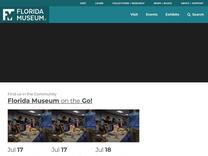Search and Browse | Historical Archaeology Type Gallery https://www.floridamuseum.ufl.edu/typeceramics/browse/4/
The Florida Museum of Natural History, located at the University of Florida, inspires people to value the biological richness and cultural heritage of our diverse world and make a positive difference in its future.
ARZOBISPO SPAIN, SEVILLA SPAIN, TALAVERA SPAIN, ZARAGOZA TEXAS TEXAS, GOLIAD TOBAGO VENEZUELA

